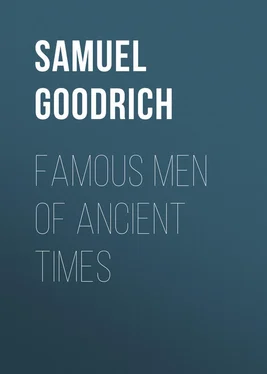Samuel Goodrich - Famous Men of Ancient Times
Здесь есть возможность читать онлайн «Samuel Goodrich - Famous Men of Ancient Times» — ознакомительный отрывок электронной книги совершенно бесплатно, а после прочтения отрывка купить полную версию. В некоторых случаях можно слушать аудио, скачать через торрент в формате fb2 и присутствует краткое содержание. Жанр: foreign_prose, на английском языке. Описание произведения, (предисловие) а так же отзывы посетителей доступны на портале библиотеки ЛибКат.
- Название:Famous Men of Ancient Times
- Автор:
- Жанр:
- Год:неизвестен
- ISBN:нет данных
- Рейтинг книги:5 / 5. Голосов: 1
-
Избранное:Добавить в избранное
- Отзывы:
-
Ваша оценка:
- 100
- 1
- 2
- 3
- 4
- 5
Famous Men of Ancient Times: краткое содержание, описание и аннотация
Предлагаем к чтению аннотацию, описание, краткое содержание или предисловие (зависит от того, что написал сам автор книги «Famous Men of Ancient Times»). Если вы не нашли необходимую информацию о книге — напишите в комментариях, мы постараемся отыскать её.
Famous Men of Ancient Times — читать онлайн ознакомительный отрывок
Ниже представлен текст книги, разбитый по страницам. Система сохранения места последней прочитанной страницы, позволяет с удобством читать онлайн бесплатно книгу «Famous Men of Ancient Times», без необходимости каждый раз заново искать на чём Вы остановились. Поставьте закладку, и сможете в любой момент перейти на страницу, на которой закончили чтение.
Интервал:
Закладка:
Having placed the capital in a proper state for defence, at the end of three months from its capture, Belisarius led forth his army, leaving only five hundred troops to guard the city. Gelimer was now within twenty miles of the capital, having raised an army of one hundred thousand men. No sooner had the Romans taken up their march toward his camp, than they prepared for battle. The armies soon met, and Belisarius, having determined to direct all his endeavors against the centre of the Vandal force, caused a charge to be made by some squadrons of the horse guards. These were repulsed, and a second onset, also, proved unsuccessful.
But a third prevailed, after an obstinate resistance. The ranks of the enemy were broken; Zazo, the king's brother, was slain, and consternation now completed the rout of the Vandals. Gelimer, under the influence of panic, betook himself to flight; his absence was perceived, and his conduct imitated. The soldiers dispersed in all directions, leaving their camp, their goods, their families, all in the hands of the Romans. Belisarius seized upon the royal treasure in behalf of his sovereign, and in spite of his commands, the licentious soldiers spent the night in debauchery, violence and plunder.
Gelimer fled to the mountains of Papua, inhabited by a savage but friendly tribe of Moors. He sought refuge in the small town of Medenus, which presented a craggy precipice on all sides Belisarius returned to Carthage, and sent out various detachments, which rapidly subdued the most remote portions of the Vandal kingdom.
Immediately after the capture of Carthage, he had despatched one of his principal officers to Justinian, announcing these prosperous events. The intelligence arrived about the time that the emperor had completed his pandects . 1 1 These were a digest of the civil law of Rome, made by the order of Justinian, and have been preserved to our time. They contained five hundred and thirty-four decisions or judgments of lawyers, to which the emperor gave the force of law. The compilation consists of fifty books, and has contributed to save Justinian's name from the contempt and reproach which had otherwise been heaped upon it.
The exultation of the monarch is evinced by the swelling titles he assumes in the preamble of these laws. All mention of the general by whom his conquests had been achieved, is carefully avoided; while the emperor is spoken of as the "pious," "happy," "victorious," and "triumphant!" He even boasts, in his Institutes, of the warlike fatigues he had borne, though he had never quitted the luxurious palace of Constantinople, except for recreation in some of his neighboring villas.
While the Roman general was actively employed at Carthage, Pharus was proceeding in the siege of Medenus, which had been begun immediately after the flight of Gelimer. Pent up in this narrow retreat, the sufferings of the Vandal monarch were great, from the want of supplies and the savage habits of the Moors. His lot was likewise embittered by the recollection of the soft and luxurious life to which he had lately been accustomed.
During their dominion in Africa, the Vandals had declined from their former hardihood, and yielded to the enervating influence of climate, security and success. Their arms were laid aside; gold embroidery shone upon their silken robes, and every dainty from the sea and land were combined in their rich repasts. Reclining in the shade of delicious gardens, their careless hours were amused by dancers and musicians, and no exertion beyond the chase, interrupted their voluptuous repose. The Moors of Papua, on the contrary, dwelt in narrow huts, sultry in summer, and pervious to the snows of winter. They most frequently slept upon the bare ground, and a sheepskin for a couch was a rare refinement. The same dress, a cloak and a tunic, clothed them at every season, and they were strangers to the use of both bread and wine. Their grain was devoured in its crude state, or at best was coarsely pounded and baked, with little skill, into an unleavened paste.
Compelled to share this savage mode of life, Gelimer and his attendants began to consider captivity, or even death, as better than the daily hardships they endured. To avail himself of this favorable disposition, Pharus, in a friendly letter, proposed a capitulation, and assured Gelimer of generous treatment from Belisarius and Justinian. The spirit of the Vandal prince, however, was still not wholly broken, and he refused the offers, while acknowledging the kindness of his enemy. In his answer he entreated the gifts of a lyre, a loaf of bread, and a sponge, and his messenger explained the grounds of this singular petition. At Medenus, he had never tasted the food of civilized nations, he wished to sing to music an ode on his misfortunes written by himself, and a swelling on his eyes needed a sponge for its cure. The brave Roman, touched with pity that such wants should be felt by the grandson and successor of Genseric, forthwith sent these presents up the mountain, but by no means abated the watchfulness of his blockade.
The siege had already continued for upwards of three months, and several Vandals had sunk beneath its hardships, but Gelimer still displayed the stubborn inflexibility usual to despotic rulers, when the sight of a domestic affliction suddenly induced him to yield. In the hovel where he sat gloomily brooding over his hopeless fortunes, a Moorish woman was preparing, at the fire, some coarse dough. Two children, her son and the nephew of Gelimer, were watching her progress with the eager anxiety of famine. The young Vandal was the first to seize the precious morsel, still glowing with heat, and blackened with ashes, when the Moor, by blows and violence, forced it from his mouth. So fierce a struggle for food, at such an age, overcame the sternness of Gelimer. He agreed to surrender on the same terms lately held out to him, and the promises of Pharus were confirmed by the Roman general, who sent Cyprian as his envoy to Papua. The late sovereign of Africa reentered his capital as a suppliant and a prisoner, and at the suburb of Aclas, beheld his conqueror for the first time.
With the capitulation of Gelimer, the Vandal was at an end. There now remained to Belisarius but the important task of making the conquered countries permanently useful to the Romans. But, while occupied in this design, his glory having provoked envy, he was accused to Justinian of the intention of making himself king over the territories he had conquered. With the weakness of a little mind, the emperor so far yielded to the base accusation as to send a message to Belisarius, indicating his suspicions. The latter immediately departed from Carthage, and, taking with him his spoils and captives, proceeded to Constantinople.
This ready obedience dissipated the suspicions of the emperor, and he made ample and prompt reparation for his unfounded jealousy. Medals were struck by his orders, bearing on one side the effigy of the emperor, and on the other that of the victorious general, encircled by the inscription, Belisarius, the glory of the Romans . Beside this, the honors of a triumph were decreed him, the first ever witnessed in the Eastern capital.
The ceremony was in the highest degree imposing. The triumphal procession marched from the house of Belisarius to the hippodrome, 2 2 A space where the chariot races were exhibited.
filled with exulting thousands, where Justinian and Theodora sat enthroned. Among the Vandal captives, Gelimer was distinguished by the purple of a sovereign. He shed no tears, but frequently repeated the words of Solomon, "Vanity of vanities: all is vanity." When he reached the imperial throne, and was commanded to cast aside the ensigns of royalty, Belisarius hastened to do the same, to show him that he was to undergo no insult as a prisoner, but only to yield the customary homage of a subject. We may pause for a moment to reflect upon the caprices of fortune, which had raised a comedian, in the person of Theodora, to see the successor of Genseric and Scipio prostrate as slaves before her footstool.
Интервал:
Закладка:
Похожие книги на «Famous Men of Ancient Times»
Представляем Вашему вниманию похожие книги на «Famous Men of Ancient Times» списком для выбора. Мы отобрали схожую по названию и смыслу литературу в надежде предоставить читателям больше вариантов отыскать новые, интересные, ещё непрочитанные произведения.
Обсуждение, отзывы о книге «Famous Men of Ancient Times» и просто собственные мнения читателей. Оставьте ваши комментарии, напишите, что Вы думаете о произведении, его смысле или главных героях. Укажите что конкретно понравилось, а что нет, и почему Вы так считаете.












